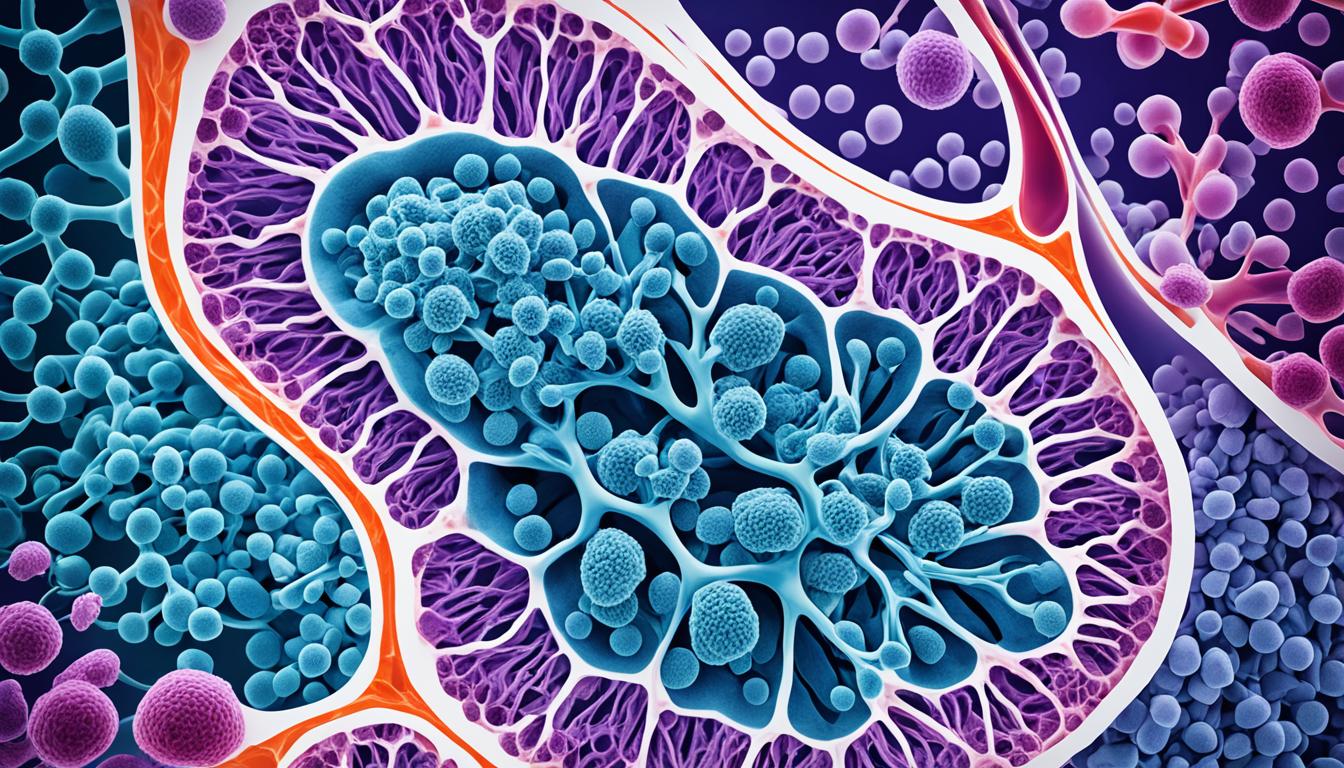Pelvic inflammatory disease, or PID, is a common but treatable infection. It mainly affects the female reproductive organs. It’s often caused by sexually transmitted infections, including gonorrhea and chlamydia. Other infections, like bacterial vaginosis, can also lead to PID.
PID can result in serious issues if not treated. These can include problems like infertility, ectopic pregnancy, and ongoing pelvic pain. It’s very important to catch and treat PID early to avoid these risks. Doctors will check your medical history, give you a pelvic exam, and test for STIs to confirm if you have PID.
The main treatment for PID is antibiotics to clear up the infection. Sometimes, if the case is severe, you might need to go to the hospital or even have surgery. To stay safe from PID, make sure to have safe sex. This means using condoms, being careful with how many sexual partners you have, and getting tested regularly for STIs.
Key Takeaways:
- Pelvic inflammatory disease (PID) is a common infection of the female reproductive organs.
- The main causes of PID are sexually transmitted infections, such as gonorrhea and chlamydia.
- Untreated PID can lead to infertility, ectopic pregnancy, and chronic pelvic pain.
- Diagnosis involves a medical history review, pelvic exam, and testing for STIs.
- Treatment for PID usually includes antibiotics, with possible hospitalization or surgery in severe cases.
Symptoms of Pelvic Inflammatory Disease
Pelvic inflammatory disease or PID has various symptoms that can differ in how bad they are. Sometimes they might be very mild or hard to notice. Knowing these signs is key to getting early medical help and avoiding problems.
Symptoms you might feel with PID include:
- Abnormal vaginal discharge
- Lower abdominal pain
- Pain during urination
- Painful intercourse
- Abnormal menstrual bleeding
- Fever
- Chills
- Nausea
- Vomiting
But, feeling one or more of these doesn’t always mean you have PID. They could show up with other health issues too. So, it’s vital to see a doctor for a clear checkup and the right care.
It’s smart to get help if you notice any of these symptoms. Catching and treating PID early can stop the infection from getting worse. It also lowers the risk of problems down the road.
Why Are These Symptoms Important?
Spotting PID symptoms quickly is crucial for staying healthy. The earlier PID is found and treated, the less chance of serious effects. These can include not being able to get pregnant, constant pain in the pelvis, and a pregnancy happening outside the uterus. Knowing these signs and acting fast are very important.
| Symptom | Description |
|---|---|
| Abnormal vaginal discharge | Unusual changes in color, consistency, or odor of vaginal discharge |
| Lower abdominal pain | Discomfort or pain in the lower abdomen, often ranging from mild to severe |
| Pain during urination | Discomfort or burning sensation while urinating |
| Painful intercourse | Experiencing pain or discomfort during sexual intercourse |
| Abnormal menstrual bleeding | Irregular or unusually heavy bleeding during menstruation |
| Fever | Elevated body temperature above the normal range |
| Chills | Feeling cold or shivering despite normal room temperature |
| Nausea | Feeling of sickness or queasiness in the stomach |
| Vomiting | Forceful expulsion of stomach contents through the mouth |
Complications and Risks of Pelvic Inflammatory Disease
Pelvic inflammatory disease (PID) can cause lasting issues. These can greatly affect reproductive health and overall health.
Infertility
PID can lead to infertility by damaging the fallopian tubes. These tubes help move eggs to the uterus for fertilization. Infertility causes deep emotional pain for those wanting children.
Ectopic Pregnancy
Having PID raises the chance of ectopic pregnancy. This occurs when a fertilized egg gets stuck in a fallopian tube. It’s a dangerous condition that needs quick medical attention to prevent serious complications.
Chronic Pelvic Pain
PID can also cause ongoing pelvic pain. This pain can make daily life hard and negatively impact mental health. It stems from the infection’s inflammation and scarring in the pelvic area.
Infection Spread
Left untreated, PID can spread and harm other pelvic organs. This leads to more complications and, possibly, more infections. Early treatment is key to prevent these issues.
Treatment and Prevention
It’s crucial to get treated for PID early to lower risks. Treatment often involves antibiotics. In extreme cases, surgery might be needed. Preventing PID involves safe sex practices and regular STI checks.
| Complications of PID | Risks |
|---|---|
| Infertility | Increased risk due to fallopian tube damage |
| Ectopic Pregnancy | Higher likelihood of implantation outside the uterus |
| Chronic Pelvic Pain | Long-lasting pain affecting quality of life |
| Infection Spread | Risk of infection extending to other pelvic organs |
Handling PID well needs early diagnosis and proper care. Knowing the dangers and acting early can safeguard reproductive and overall health.
Stem Cell Therapy for Pelvic Inflammatory Disease and its Impact on Fertility
Stem cell therapy is a promising field for treating diseases, including pelvic inflammatory disease (PID). It’s still being studied, but it shows it might help repair PID’s damage and boost fertility.
It uses stem cells to grow new, healthy tissue in organs like the fallopian tubes, which are vital for fertility. These cells can change into other cell types needed for healing.
So far, early findings show promise. But, we need more research to confirm if stem cell therapy for PID is both safe and effective. It’s key to talk to a doctor about the pros and cons before considering this treatment.
We’re hoping that as research in stem cells advances, more effective treatments for PID will emerge. This could lead to better lives for those dealing with PID and fertility issues.

